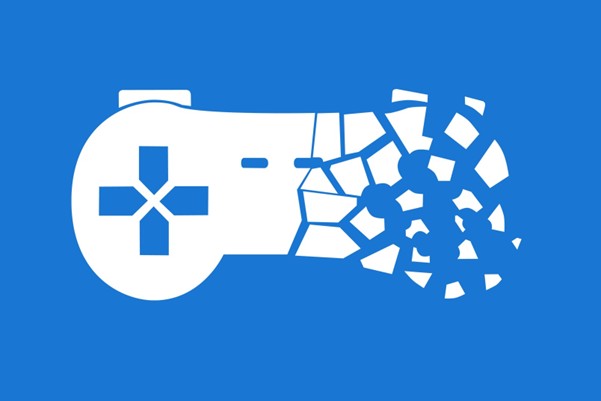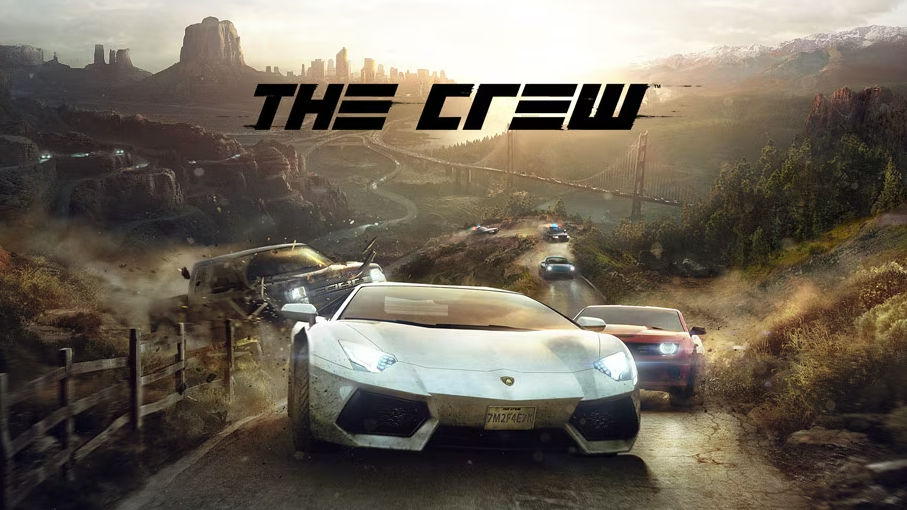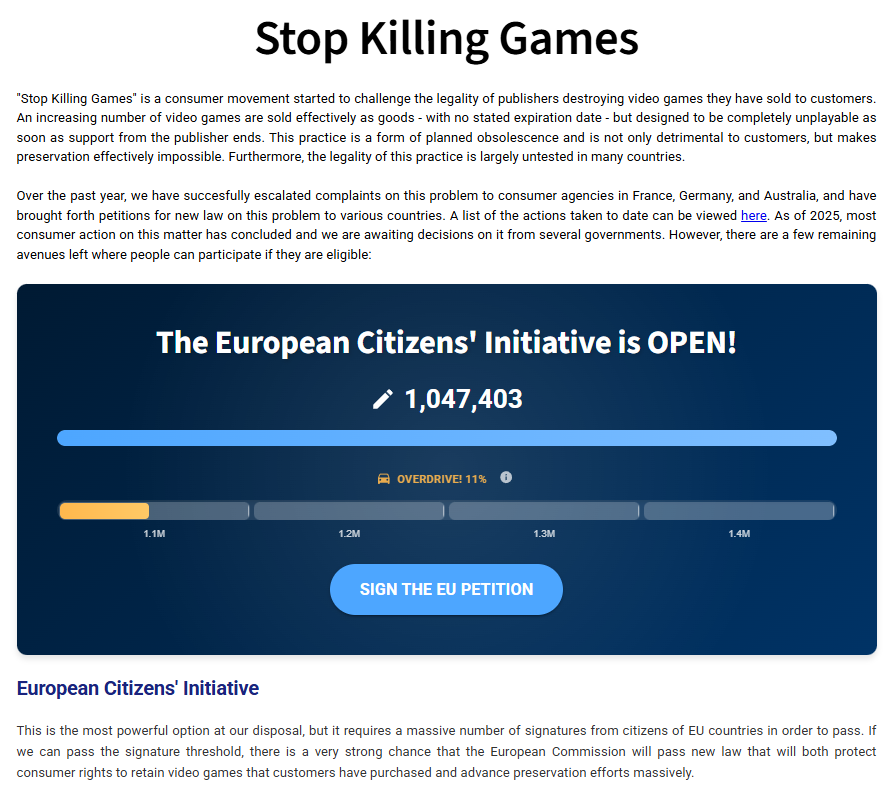The big "Stop Killing Games" petition just hit 1 million signatures — in partial thanks to one dev who tried to kill it
#StopKillingGames completed its goal despite one prominent developer opposing the movement.

All the latest news, reviews, and guides for Windows and Xbox diehards.
You are now subscribed
Your newsletter sign-up was successful
"Stop Killing Games" is a consumer-led movement that does exactly what the name suggests.
Spearheaded by Ross Scott (Accursed Farms), its main goal is to preserve access to video games even after "official support" comes to an end.
Since launching in April 2024, the movement has gained serious momentum, striking a chord with players who are tired of seeing games they’ve paid for become completely unplayable once servers shut down.
Despite what is seemingly a positive campaign, one indie developer and former Blizzard staffer has been vocal in their opposition, actively discouraging people from signing the petition and pushing back against the movement’s message. However, in a textbook case of the Streisand effect, the drama pushed the petition to new heights, and may now trigger serious legislative discussions as a result.
Here's what Stop Killing Games is all about, how it almost died, and then ended up being stronger than ever — and why the "backlash" ultimately helped the movement hit its goal.
What is the “Stop Killing Games” Movement?
The core principle behind the movement is that players are losing access to games they’ve paid for once the servers for those games go offline. This isn’t just a hypothetical; it’s already happening. Titles like The Crew, Battleborn, and many others have been fully disabled or delisted from digital storefronts, leaving players who invested time and money with essentially nothing to show for it. Literally today, EA announced that Anthem will be sunsetting its online services too.
Games like Anthem revolve entirely around online play, which naturally require online infrastructure and on-going investment to function. However, the issue goes beyond just live service titles where multiplayer is the focus.
All the latest news, reviews, and guides for Windows and Xbox diehards.
Increasingly, single-player games require a constant internet connection to function, whether it’s DRM, server-side progression, or episodic content being locked behind download server, once support ends, players often lose access to games they thought they owned. Shutdowns are especially prevalent in mobile gaming as well, even for titles that don't require any form of multiplayer or online functionality.
These shutdowns often happen with little warning and no compensation. In the case of The Crew, Ubisoft told users they couldn’t complain about the shutdown because, despite paying for the game, they never actually owned it.

Stop Killing Games is pushing back against this exact practice. Its core belief is that if a game is sold, it should always remain playable in some form, even after official support ends.
Ross Scott has proposed several solutions to achieve this, such as including offline modes, making server software public so communities can host their own, and introducing legal protections that enforce these rights. The focus isn’t on keeping every game running forever, but on giving players the ability to preserve them if they want to. In support of the cause, Ross noted that 68% of 700 online-dependent games are already unplayable or will become unplayable soon.
Microsoft has been better than most big companies with regards to game preservation, enabling support for backward compatibility with original Xbox and Xbox 360 games on modern Xbox One and Xbox Series X|S consoles. However, even this requires some online functionality, and furthermore, Microsoft itself is unable to provide access to some of the games owing to licensing rights on older titles. In some cases, the entities that "own" the games no longer even exist.
Legislation could help justify an expansion of formal backward compatibility programs like Xbox's, even in cases where licensing rights are unobtainable. The Forza racing games, with its licensed vehicles, is a notable example of a franchise where expiring licenses lead to the delisting of games. Owners can still play them, but increasingly, Microsoft is shifting its operation away from disc-based games to digital-only, which, again, prevents full ownership and the guarantee of perpetual access.
Blizzard notoriously ended up reviving World of Warcraft "Classic" in response to pirated servers, after saying things like "you think you want it, but you don't." Turns out that people really did want it, and WoW Classic helped buoy user engagement at a time where the game was otherwise in decline.
Speaking of Blizzard ...
PirateSoftware Pushes back, by misunderstanding the movement
In December 2024, Jason Hall, known online as PirateSoftware, is a former Blizzard employee turned Twitch streamer who regularly shares commentary on industry issues. However, his stance on Stop Killing Games had been far from supportive. He criticised the movement as being too vague, overly idealistic, and ultimately impractical.
PirateSoftware argued that it places an unfair burden on indie studios by expecting them to provide post-shutdown access. He also pushed back on the idea of government involvement, suggesting it would create more problems than it solves.
Hall’s video sparked immediate backlash within the gaming community. Many felt that he had misrepresented the movement’s goals, painting it as more extreme than it was. Despite the criticism, the video led to a visible drop in petition signatures in early 2025, as confusion about the campaign’s intent spread.
In response, Ross Scott published a detailed FAQ and follow-up videos throughout January and February 2025, clarifying that the movement’s goal was not to keep every game online forever, but to ensure that players had some legal means and protections to acquire continued access once official support ends
Despite PirateSoftware’s efforts to stop the movement, support from major content creators helped reignite interest by mid-2025. MoistCr1TiKaL released multiple videos, disputing PirateSoftware’s take and defending the core message of Stop Killing Games.
Around the same time, in June/July 2025, PewDiePie and Jacksepticeye also publicly voiced their support, amplifying the campaign’s reach. SomeOrdinaryGamers has been discussing and supporting the topic as far back as 2024, and helped popularise the quote “Piracy isn’t stealing if Buying Isn’t Owning…”, in 2025 after Ubisoft made their comments regarding not owning games.
Join the Movement: How to Support Stop Killing Games in the EU & UK
The movement started to gain traction again, thanks largely to content creators stepping up and calling for action, and the continued effort of Ross Scott who has championed this movement for so long. But without real tangible change, nothing will stop companies from continuing to make games, take our money, and then pull those games offline.
Awareness alone isn’t enough to stop this from happening. People need to sign the petition and continue providing support for the initiative.

Ross Scott’s original goal was to reach one million verified EU signatures, which would force the European Commission to formally consider new legislation. This being the same commission that pushed Apple to adopt USB-C in its iPhones, showing that pressure from the EU can influence major tech policy.
With the milestone now officially reached, Ross still urges people to sign the petition due to concerns over unverifiable or potentially invalid signatures, the bar has effectively been raised. The current target now sits at 1.5 million to ensure that, even after validation, the petition qualifies for review. This development highlight just how important continued support is, even after reaching the initial goal.
- Sign the EU initiative: European Citizens' Initiative - Stop Destroying Video Games.
- Sign the UK Petition: Prohibit publishers irrevocably disabling video games they have already sold.
- Learn more about the campaign: https://stopkillinggames.com.
It's important to remember that this movement is ultimately about game preservation. It’s about being able to return to that online-only game you bought years ago and still have a way to play it, even if it’s just through peer-to-peer matches with friends or by joining a server hosted by the community.
This isn’t about demanding publishers keep servers running forever or that every feature necessarily remains intact. It’s about giving players the tools and freedom to keep these games alive in some form, long after official support has ended. The heart of this movement is truly about preserving access to the games we’ve paid for, enjoyed and still care about.

Adam is a Psychology Master’s graduate passionate about gaming, community building, and digital engagement. A lifelong Xbox fan since 2001, he started with Halo: Combat Evolved and remains an avid achievement hunter. Over the years, he has engaged with several Discord communities, helping them get established and grow. Gaming has always been more than a hobby for Adam—it’s where he’s met many friends, taken on new challenges, and connected with communities that share his passion.
You must confirm your public display name before commenting
Please logout and then login again, you will then be prompted to enter your display name.
